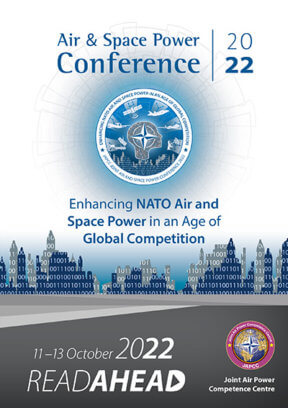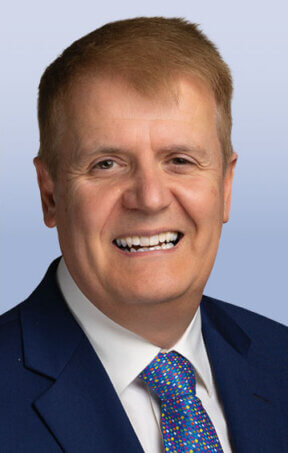Esteemed Colleagues,
There is little doubt today that we live in a time of renewed global competition between major state powers. This also means that we live in what is, potentially, an extremely hazardous age. In recent times, we have little to be thankful for from some of the so-called ‘Great Powers’. China (albeit most likely by accident) has brought us pestilence in the form of the Covid-19 virus. Russia (most definitely, by design) has brought us war in Ukraine. Not even one-quarter of the way into the 21st Century, and already we seem to have endured (and may continue to endure) two of the Biblical ‘four horsemen of the Apocalypse’. It is against this forbidding backdrop that the 2022 JAPCC Conference will take place.
On the first day of last year’s JAPCC Conference, we heard that in the more than seventy years since the end of WWII and more than thirty since the end of the Cold War, NATO needed to find a ‘forcing function’ to make national governments realise that threats to our democratic way of life had not gone away. One of the main speakers expressed his (and everyone else’s) sincere hope that it would not be another war that provided this ‘forcing function’. Sadly, war on the European continent once more proves to be a powerful motivator for governments to take robust action in deterrence and defence.
Individual NATO nations, along with the EU and the UN, have to a greater or lesser degree, begun to give the Ukrainians the help they so desperately need. However, in our dealings with and perceptions of Russia prior to the invasion of Ukraine, many of us, including many of our political leaders, have been exposed as – at best – naive. At worst, some might even say complicit.
It is exceptionally timely that the JAPCC Conference plans to bring some of our greatest minds and senior decision-makers together to consider how NATO might enhance its air and space power in this age of global competition. Along with our keynote speakers, the four conference panels will consider the broader geopolitical situation and the implications this has for our security. The speakers and panel members will analyse the consequences this new environment brings for deterrence and defence and what it means for defence and operational planning, and for agile, cross-domain command, from both defence and industry perspectives.
The traditional DIME model – diplomatic, informational, military and economic – reminds us that military power does not sit apart from the other instruments of power. We have only to think of Europe’s reliance on Russian oil and gas supplies to realise the complexity of miscalculations that may have emboldened Putin’s decision to invade Ukraine. The comprehensive requirements for defence and security must not be ignored. If deterrence fails, the effective defence of NATO territory will depend on our military forces, their effective command and control, along with comprehensive resiliency in the domains of Space and Cyber. Additionally, NATO is well aware that a comprehensive resiliency must also include the ensured availability of vital state and economic functions and continued use of the EMS. Warfare in collective defence will need to include other instruments of power alongside the military.
The articles you are about to read are the result of a ‘call for papers’ that was put out shortly after last year’s conference. Not all of them refer directly to Joint Air and Space Power. However, they are all relevant to a discussion about the future security environment and its consequences for NATO’s posture, operational preparedness and the role of Air and Space Power in this environment. The two introductory articles explain the term ‘global competition’ chosen for this conference and explore the principles of Great Power competition. Subsequent articles analyse the links and interdependencies between the space and cyberspace domains, refer to some interesting similarities between thresholds in these domains, and propose how deterrence might be ensured in space through a responsive space architecture.
Artificial Intelligence (AI) and the dangers of seeing it as a panacea to overcome information and data overload was already touched on at the 2021 Conference. One of our articles will therefore provide a perspective on ‘humanly enhanced’ AI to enable understanding and achieve decision advantage. Another author makes us aware that we have to expect Adversarial Machine Learning and delivers a very well-argued note of caution. Managing operational data in a ‘combat cloud’ can offer effective support in scenarios where forces and capabilities operate across domains. Finding principles for the safe sharing of cyber weapons and capabilities needs urgent consideration in response to the particular challenges we find in and through this domain. The JAPCC thanks all the authors that have contributed articles – what you will read in the following pages is a carefully curated subset of those contributions.
The success of the 2021 JAPCC Conference was, in no small part, due to the perseverance of all those who attended in some challenging circumstances. We live in difficult times, but the efforts of everyone in coming together to discuss, analyse and formulate courses of action for the future will ensure that the 2022 Conference is just as rewarding.
I look forward to meeting you all in October!
Bruce Hargrave BSc MBA
Independent Air and Space Power Advisor









